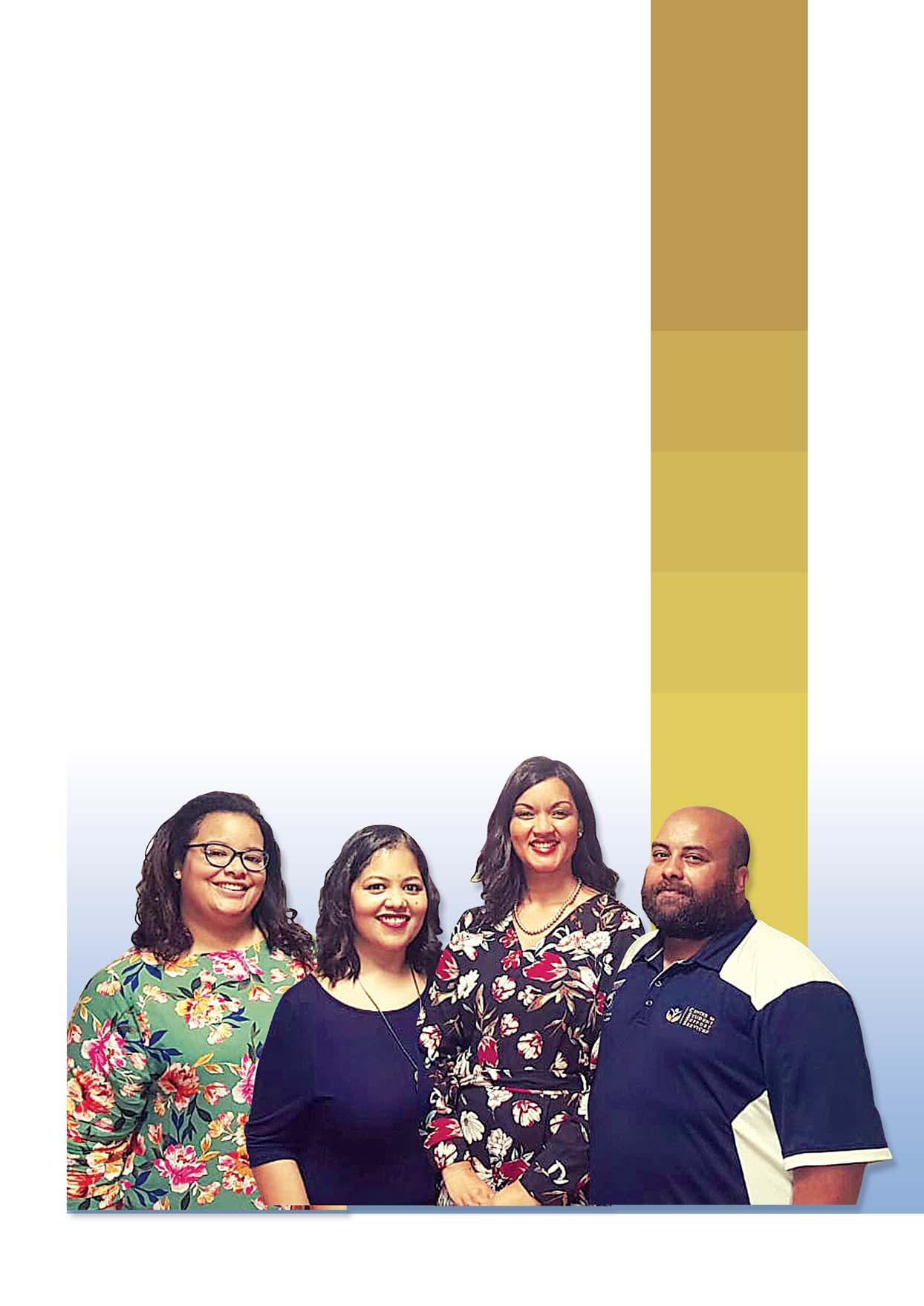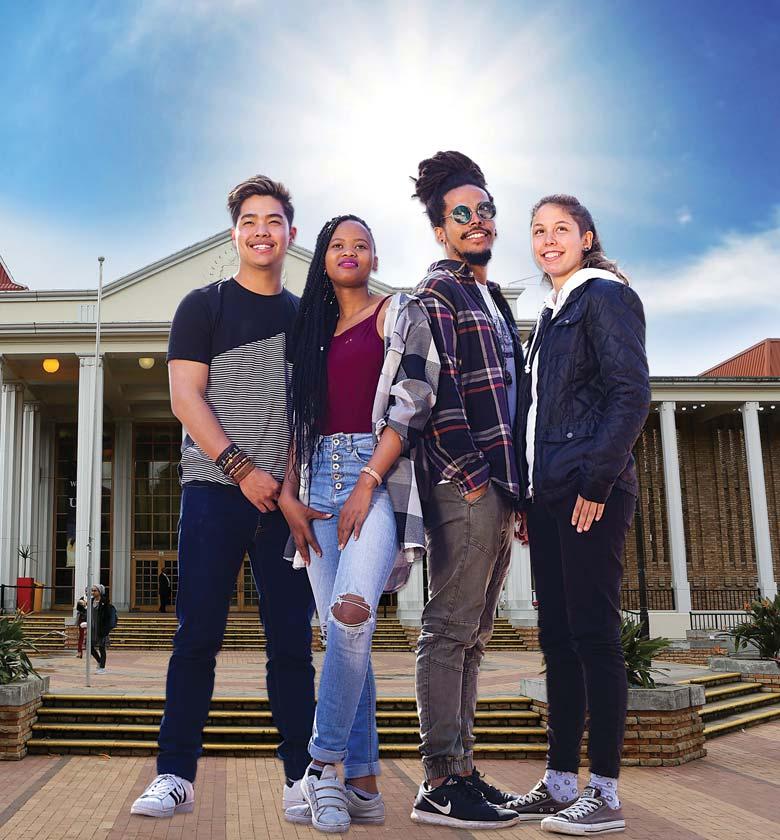
4 minute read
Professional Development
FUTURE-READY STAFF KEEP LEARNING
The University of the Western Cape’s (UWC) graduate attribute of an attitude towards lifelong learning is developed amongst Student Development and Support (SDS) staff as well. Bearing testimony to this, our staff members have over the last fi ve years engaged in a variety of continuous professional development and academic progression programmes.
SDS HAS BEEN ENCOURAGING staff to develop their skills through establishing human resource training activities, including 153 workshops attended during UWC’s Institutional Operating Plan (IOP) period 2016 to 2020. Our staff are also affi liated to various professional bodies within the higher education sector. This includes the Health Professions Council of South Africa (HPCSA); Educational Psychology Association of South Africa (EPASSA); South African Council for Social Service Professions (SACSSP); Southern African Association for Counselling and Development in Higher Education (SAACDHE); South African Graduate Employers Association (SAGEA); Association of College and University Housing Offi cers International (ACUHO-I South African Chapter); Higher Education Disability Services Association (HEDSA); South African Association of Senior Student Aff airs Professionals (SAASSAP).
At an institutional level, SDS has served on 17 committees at UWC, participating infl uentially towards the realisation of the goals in the UWC IOP as well as infl uencing higher education activities nationally.
Staf f academic pursuits
36
DEGREES COMPRISING:
6
PHD DEGREES
5
MASTERS DEGREES
2
HONOURS DEGREES
23
UNDERGRADUATE DEGREES
STUDENT DEVELOPMENT AND SUPPORT (SDS) STAFF ARE ALWAYS STRIVING TO IMPROVE THEMSELVES AND ENSURE OUR SERVICES REMAIN EFFECTIVE.
A few of the main committees SDS staff served on are the Senate Executive Committee; UWC IOP Task Team; Marketing and Recruitment Support Forum; Registrar’s Administrative Forum; SDS Co-Curricular Record Committee; First Year Experience Reference Group; SASI Road Map Project; Safe Campus Project; Graduate Competency Development Task Team; Sexual Violence Task Team; UWC Food Security Task Team.
A key professional development activity in which SDS contributes towards has been UWC being recognised as a quality institution of learning and teaching. This was achieved through providing internship training for social work students in their fi nal year of qualifi cation.
Strengthening professional links has led to Therapeutic Services (TS) at the Centre for Student Support Services (CSSS) in the offi ce of SDS gaining accreditation with the HPCSA as a psychology intern training site, allowing MPsych students to complete their fi nal year of training before writing their national board exams and registering as psychologists.
The TS at CSSS internship programme is well known and respected nationally for excellent training of counseling psychologists. The internship year requires intensive training and supervision of two selected intern psychologists per annum. The intern psychologists deliver a professional counseling service to UWC students under close supervision from senior psychologists at TS. The intern psychologists off er individual and group counseling, psychometric assessments, community service, crisis intervention and psycho-educational workshops to UWC students.
In the past eight years, all the intern psychologists trained at TS, CSSS passed their board exams on the fi rst attempt and registered as professional psychologists with the HPCSA.
SDS introduced a much-needed programme to address gender-based violence in general and specifi cally a trauma response option for survivors of rape and/or sexual assault.
In partnership with Rape Crisis and the Thuthuzela Care Centre at Karl Bremer Hospital, survivors of this trauma had direct access to a “one-stop-centre” to off er medical, forensic, legal and counseling support, free of charge.
Rape Crisis trained a number of UWC staff members and student leaders to be fi rst responders in cases of rape and/or sexual assault. Clear protocols were put in place across UWC to off er an effi cient and rapid, co-ordinated emergency response to all reported cases of rape/sexual assault. These partnerships are maintained and services are regularly evaluated and adjusted to serve the student population as best as possible. The fi ght against gender-based violence and specifi cally sexual assault and rape is an ongoing main focus area for SDS. Through SDS, UWC is also the only university in Africa with trained facilitators to off er an internationally accredited Personal Mastery and Empowerment Training Programme amongst higher education students and staff , and this is in affi liation with the IMAGINE Global Change Initiative. SDS staff ’s personal growth includes furthering their academic qualifi cations and participating in a number of conferences. At least fi ve of these conferences were at international locations, which included a presentation at the University of Porto, Portugal, with the topic presented being ‘Embedding Job Search Skills into the Curriculum at UWC’.
Another international presentation was delivered at the IMAGINE Personal Mastery and Empowerment Institute Global Summit in Morocco and Amman respectively, while Italy and Botswana hosted sports conferences which were attended by SDS delegates.
Staf f conference attendance in numbers:
73
STAFF MEMBERS
attended various conferences
50
NATIONAL CONFERENCES
attended
34
PRESENTATIONS
were delivered by staff
5
INTERNATIONAL CONFERENCES
attended
Staf f topics presented at national conferences:
n Career Services ‘on-theline’: The experience of Career
Services at the University of the Western Cape with a Client
Relationship Management Tool n Sport Leadership and
Peak Performance
n The impact of a cocurricular programme on the development of
Graduate Attributes in fi rst-year students n A gentle side to toughness, turning challenges into opportunities through sport n Exploring Social
Accountability for
Psychology
n Therapeutic Services and its effi cacy of services at UWC n Managing Student Anxiety n Towards reducing the stigma and increasing Hope and Recovery in students with mental health issues








